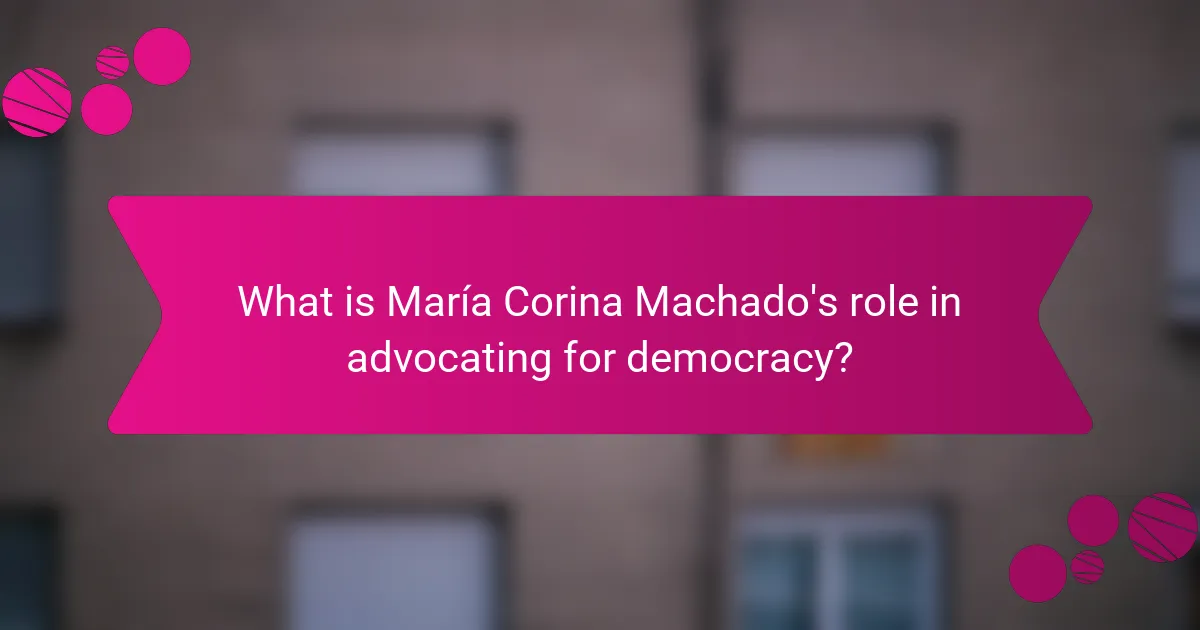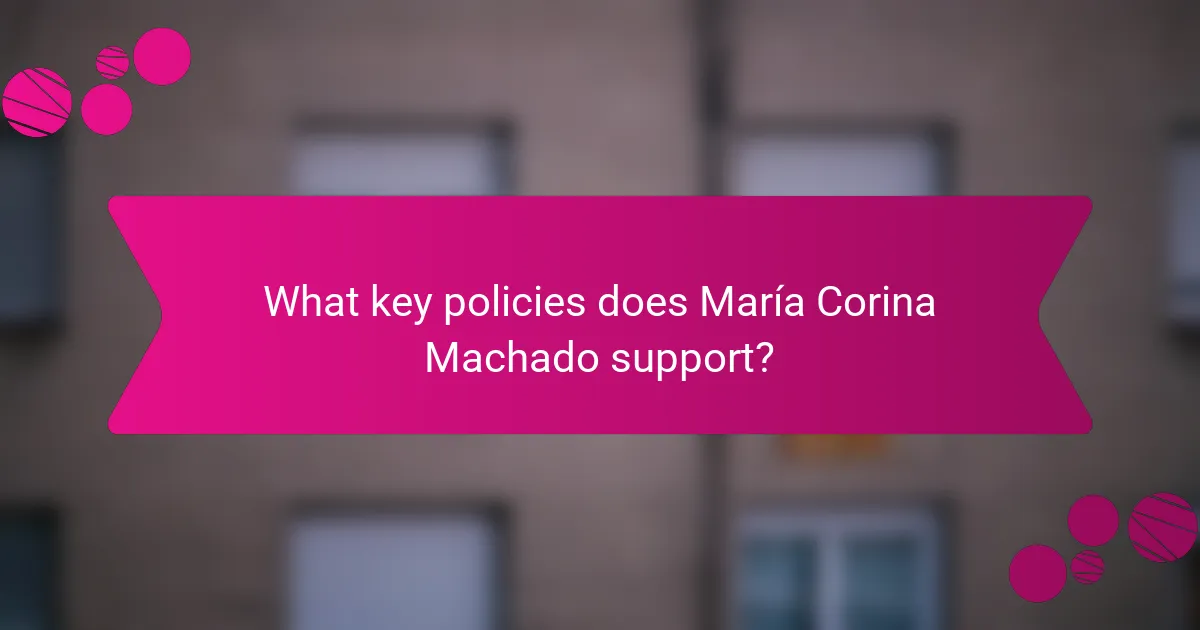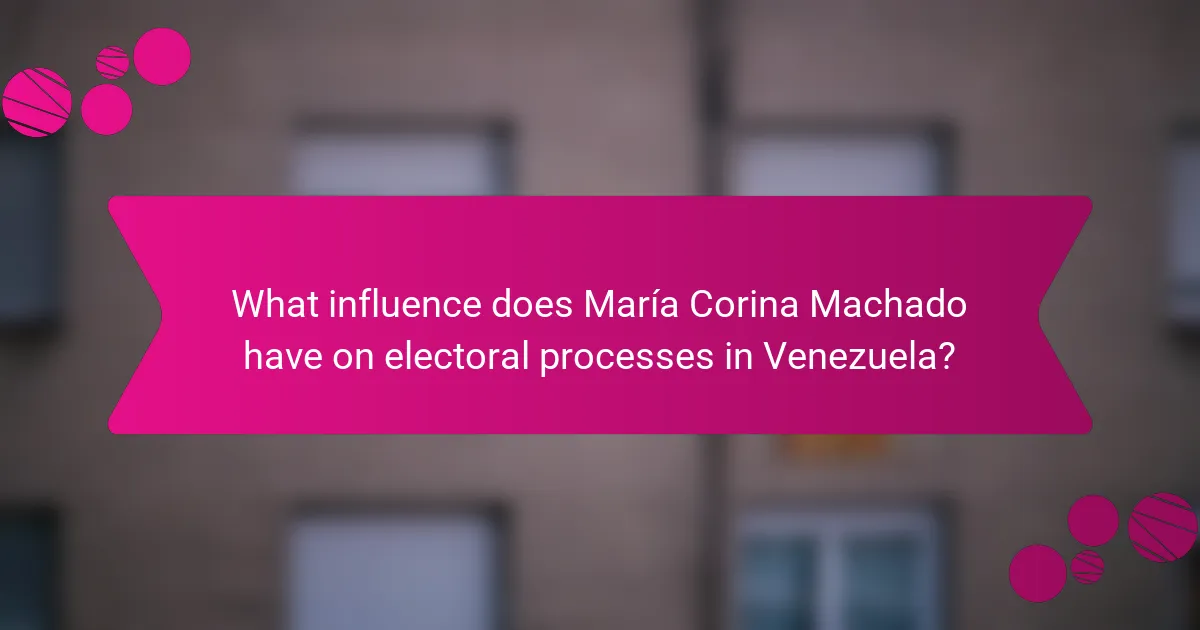
What is María Corina Machado’s role in advocating for democracy?
María Corina Machado is a prominent advocate for democracy in Venezuela. She actively campaigns against authoritarianism and promotes democratic governance. Machado co-founded the political party Vente Venezuela, which emphasizes democratic values. She has consistently criticized the Venezuelan government’s human rights violations. Machado has mobilized citizens through protests and public speaking. She calls for free and fair elections in Venezuela. Her efforts aim to restore constitutional order and civil liberties. International organizations recognize her contributions to the democratic movement.
How did María Corina Machado become involved in political advocacy?
María Corina Machado became involved in political advocacy through her early activism and leadership roles. She began her political journey by co-founding the political party Primero Justicia in 2000. Her advocacy intensified during Venezuela’s political crisis, particularly against the government of Hugo Chávez. Machado gained prominence for her outspoken criticism of the regime. She also participated in protests and campaigns advocating for democratic reforms. Her efforts focused on human rights and social justice issues. In 2013, she was elected to the National Assembly, further solidifying her political influence. Machado’s commitment to democracy has made her a key figure in Venezuela’s opposition movement.
What are the key milestones in her political career?
María Corina Machado’s key political milestones include her election to the Venezuelan National Assembly in 2010. She served as a representative for the Miranda state. In 2013, she became a prominent opposition figure after the death of Hugo Chávez. Machado co-founded the political party Vente Venezuela in 2014. She gained international recognition for her advocacy against the Maduro regime. In 2015, she was barred from holding public office, which drew widespread condemnation. In 2021, Machado was nominated as a candidate for the presidency in the 2024 elections. Her political career is marked by her commitment to democracy and human rights in Venezuela.
How has her background influenced her advocacy work?
María Corina Machado’s background as an economist and politician has significantly influenced her advocacy work. Her education in economics from the Central University of Venezuela provided her with a deep understanding of economic policies. This knowledge shapes her focus on economic reform in her advocacy. Additionally, her experience as a member of the National Assembly has equipped her with insights into political processes and governance. Her upbringing in a family engaged in public service instilled values of civic duty and social justice. These factors drive her commitment to democratic principles and human rights in Venezuela. Machado’s background informs her strategies in mobilizing support for democratic change. Her advocacy is thus rooted in a blend of economic expertise and political experience.
What are the main principles of María Corina Machado’s democratic advocacy?
María Corina Machado’s democratic advocacy is centered on principles of freedom, justice, and citizen participation. She emphasizes the importance of restoring democracy in Venezuela. Machado advocates for human rights and the rule of law. She promotes transparency and accountability in government. Her approach includes mobilizing citizens for active involvement in democratic processes. Machado also highlights the need for international support for democratic movements. She believes in the empowerment of women and marginalized groups. These principles guide her efforts to challenge authoritarianism in Venezuela.
What specific values does she promote in her advocacy efforts?
María Corina Machado promotes values of democracy, human rights, and social justice in her advocacy efforts. She emphasizes the importance of free elections and political participation. Machado advocates for transparency and accountability in governance. She highlights the need for protection of individual freedoms and civil liberties. Her efforts focus on empowering citizens to demand their rights. Machado also promotes economic opportunity and equitable access to resources. She seeks to unite diverse groups in the fight against authoritarianism. These values are evident in her public speeches and policy proposals.
How does she define democracy in the context of Venezuela?
She defines democracy in the context of Venezuela as a system where citizens have the right to choose their leaders freely. María Corina Machado emphasizes that true democracy requires fair elections and respect for human rights. She argues that the current regime undermines democratic principles. Machado points to instances of electoral fraud and repression as evidence of this erosion. She believes that restoring democracy is essential for national recovery. Machado advocates for international support to pressure the Venezuelan government. Her vision includes a government accountable to its people. This definition aligns with her broader goals for political reform in Venezuela.

What key policies does María Corina Machado support?
María Corina Machado supports policies focused on democratic governance, economic reform, and social justice. She advocates for the restoration of democratic institutions in Venezuela. Machado emphasizes the importance of free and fair elections. She also promotes economic policies aimed at liberalization and attracting foreign investment. Social justice initiatives are central to her platform, aiming to reduce poverty and improve public services. Her policies include strengthening the rule of law and protecting human rights. Machado’s stance on these issues is based on her commitment to democratic principles and national recovery.
How do her policies address the challenges facing Venezuela?
María Corina Machado’s policies aim to address Venezuela’s economic crisis, political repression, and social instability. She advocates for free-market reforms to stimulate economic growth. These reforms include reducing government intervention and encouraging private investment. Machado emphasizes the importance of restoring democratic institutions to combat political repression. She calls for transparent elections and the protection of civil liberties. Additionally, her policies focus on humanitarian aid to address social challenges. Machado’s approach includes international cooperation to secure support for Venezuela’s recovery. These strategies are designed to create a sustainable path toward democracy and economic stability.
What economic reforms does she propose?
María Corina Machado proposes several economic reforms aimed at revitalizing Venezuela’s economy. She advocates for the liberalization of the economy to promote free market principles. Machado emphasizes the need to eliminate price controls that distort supply and demand. She also calls for the reduction of state intervention in various sectors. Another key reform includes attracting foreign investment to stimulate growth. Additionally, she supports the implementation of a currency stabilization plan to combat hyperinflation. These reforms are designed to restore economic stability and enhance productivity in Venezuela.
How does she plan to improve social welfare in Venezuela?
María Corina Machado plans to improve social welfare in Venezuela by implementing comprehensive social programs. She emphasizes the need for educational reforms to enhance access to quality education. Machado advocates for healthcare improvements, focusing on increasing availability and affordability of medical services. She aims to create job opportunities through economic revitalization strategies. Machado also supports social safety nets to protect vulnerable populations. Her proposals include increasing investment in public services to ensure basic needs are met. These initiatives are designed to address the current economic crisis and improve living conditions for all Venezuelans.
What is her stance on human rights and governance?
María Corina Machado advocates for strong human rights protections and democratic governance. She emphasizes the importance of civil liberties and political freedoms. Machado has been vocal against authoritarian regimes in Venezuela. Her policies aim to strengthen institutions that uphold human rights. She supports transparency, accountability, and rule of law. Machado’s stance aligns with international human rights standards. She has received recognition for her efforts from various human rights organizations. Her advocacy is rooted in the belief that democracy is essential for human dignity.
How does she advocate for the protection of human rights?
María Corina Machado advocates for the protection of human rights through political activism and public speaking. She emphasizes the importance of democratic governance and the rule of law. Machado raises awareness about human rights violations in Venezuela. She engages with international organizations to garner support for human rights initiatives. Additionally, she participates in protests and rallies to mobilize public opinion. Her advocacy includes highlighting cases of political prisoners and repression. Machado has also addressed the United Nations about the situation in Venezuela. Her efforts aim to hold the government accountable for its actions against citizens.
What governance reforms does she suggest for Venezuela?
María Corina Machado suggests several governance reforms for Venezuela. She advocates for the establishment of an independent electoral authority. This authority would ensure fair and transparent elections. Machado also emphasizes the need for the separation of powers. Strengthening the judiciary is crucial for upholding the rule of law. Additionally, she calls for the decentralization of government functions. This decentralization would empower local governments and enhance citizen participation. Lastly, Machado stresses the importance of anti-corruption measures. These measures are essential for restoring public trust in government institutions.

What influence does María Corina Machado have on electoral processes in Venezuela?
María Corina Machado significantly influences electoral processes in Venezuela. She advocates for democratic reforms and transparency. Her leadership in the opposition has mobilized voters against the current regime. Machado’s campaigns focus on restoring constitutional order and human rights. She has consistently called for free and fair elections. Her presence in the political landscape challenges the status quo. In 2021, she gained international recognition for her stance on electoral integrity. This has increased pressure on the Venezuelan government to consider electoral reforms.
How has she impacted electoral strategies and campaigns?
María Corina Machado has significantly influenced electoral strategies and campaigns in Venezuela. She emphasizes grassroots mobilization and direct engagement with voters. Her approach includes leveraging social media to connect with younger demographics. Machado advocates for transparency and accountability in political processes. She has also focused on building coalitions among opposition parties. This strategy aims to unify various factions against the ruling government. Her campaigns often highlight issues of human rights and democratic governance. Through these efforts, she has reshaped how opposition parties strategize for electoral success.
What role does she play in mobilizing voters?
María Corina Machado plays a crucial role in mobilizing voters through her advocacy and grassroots campaigns. She actively engages with communities to raise awareness about democratic values. Machado utilizes social media platforms to reach a broader audience. She organizes rallies and events to energize supporters and encourage participation. Her messaging focuses on the importance of voting and civic responsibility. Additionally, she collaborates with various civic organizations to enhance voter outreach. Her efforts have led to increased voter registration and turnout in previous elections. This mobilization is essential for promoting democratic change in Venezuela.
How does she engage with other political parties during elections?
María Corina Machado engages with other political parties during elections by forming strategic alliances. She often participates in coalition-building efforts to unify opposition forces against the ruling party. Machado advocates for a shared platform that emphasizes democratic values and reforms. She actively communicates with party leaders to negotiate common goals. During campaigns, she collaborates on joint events and rallies to maximize visibility. Her approach aims to consolidate voter support across different political factions. This strategy has been evident in past electoral cycles, where she worked with other opposition groups. Such engagement is crucial for enhancing electoral competitiveness against incumbent candidates.
What challenges does she face in her electoral influence?
María Corina Machado faces significant challenges in her electoral influence due to government repression. The Venezuelan government frequently undermines opposition leaders through intimidation and legal actions. This creates an environment where her ability to campaign is severely restricted. Additionally, media censorship limits her reach to potential voters. Economic instability further complicates her efforts, as citizens prioritize immediate survival over political engagement. Lastly, divisions within the opposition weaken her overall electoral strategy. These factors collectively diminish her electoral influence in a highly polarized political landscape.
How do political opposition and government actions affect her campaigns?
Political opposition and government actions significantly impact María Corina Machado’s campaigns. Opposition parties often challenge her policies and credibility, which can sway public opinion. Government actions, such as legal restrictions or censorship, can limit her campaign’s reach and effectiveness. For instance, in Venezuela, the government has historically used tactics to undermine opposition candidates. These tactics include media blackouts and intimidation of supporters. Such actions create an environment of fear and uncertainty for voters. Consequently, Machado must adapt her strategies to navigate these obstacles. This dynamic shapes her campaign messaging and outreach efforts.
What strategies does she employ to overcome these challenges?
María Corina Machado employs grassroots mobilization and coalition-building to overcome challenges in her advocacy. She actively engages citizens through town hall meetings and social media campaigns. This direct communication fosters community support and awareness. Additionally, she forms alliances with other political and civil society organizations. These collaborations amplify her message and resources. Machado also utilizes international advocacy to gain external support. She seeks to raise awareness of Venezuela’s situation on global platforms. Her strategies focus on resilience and adaptability in a challenging political landscape.
What can supporters learn from María Corina Machado’s advocacy efforts?
Supporters can learn the importance of resilience and strategic communication from María Corina Machado’s advocacy efforts. Her commitment to democracy in Venezuela highlights the need for unwavering dedication in challenging political environments. Machado effectively utilizes social media to mobilize support and raise awareness. This demonstrates the power of digital platforms in modern advocacy. Additionally, her focus on grassroots movements shows how community engagement can drive political change. Machado’s ability to articulate clear policy positions illustrates the necessity of transparency in advocacy. Her experiences underscore the value of building coalitions to amplify voices and influence policy. Overall, supporters can adopt these strategies to enhance their own advocacy efforts.
How can individuals contribute to democratic advocacy in their communities?
Individuals can contribute to democratic advocacy in their communities by participating in local governance. Engaging in town hall meetings allows citizens to voice their opinions. Joining advocacy groups can amplify community issues. Volunteering for campaigns helps raise awareness about democratic values. Educating others on civic rights fosters informed participation. Utilizing social media platforms spreads awareness and mobilizes support. Writing to elected officials encourages them to address community concerns. These actions collectively strengthen democratic processes at the local level.
What best practices can be adopted from her approach to political engagement?
Best practices from María Corina Machado’s approach to political engagement include grassroots mobilization and strategic communication. Grassroots mobilization fosters community involvement and builds a strong support base. This method encourages citizens to participate actively in political processes. Strategic communication ensures that messages resonate with the public. Clear, relatable messaging can enhance public understanding of complex issues.
Additionally, leveraging social media platforms amplifies outreach efforts. This approach allows for real-time engagement with constituents. Building coalitions with like-minded organizations strengthens advocacy efforts. Collaborative initiatives can lead to more substantial political influence.
Lastly, maintaining transparency and accountability builds trust with supporters. This practice encourages sustained engagement and loyalty among constituents. These best practices have proven effective in enhancing political engagement and influence in democratic processes.
María Corina Machado is a prominent advocate for democracy in Venezuela, known for her campaigns against authoritarianism and her promotion of democratic governance. The article outlines her political journey, key milestones, and the principles guiding her advocacy, including human rights and citizen participation. It details her proposed policies aimed at addressing Venezuela’s economic and social challenges, as well as her influence on electoral processes and voter mobilization strategies. Additionally, the article highlights the challenges she faces in her efforts and offers insights into best practices for democratic advocacy.
